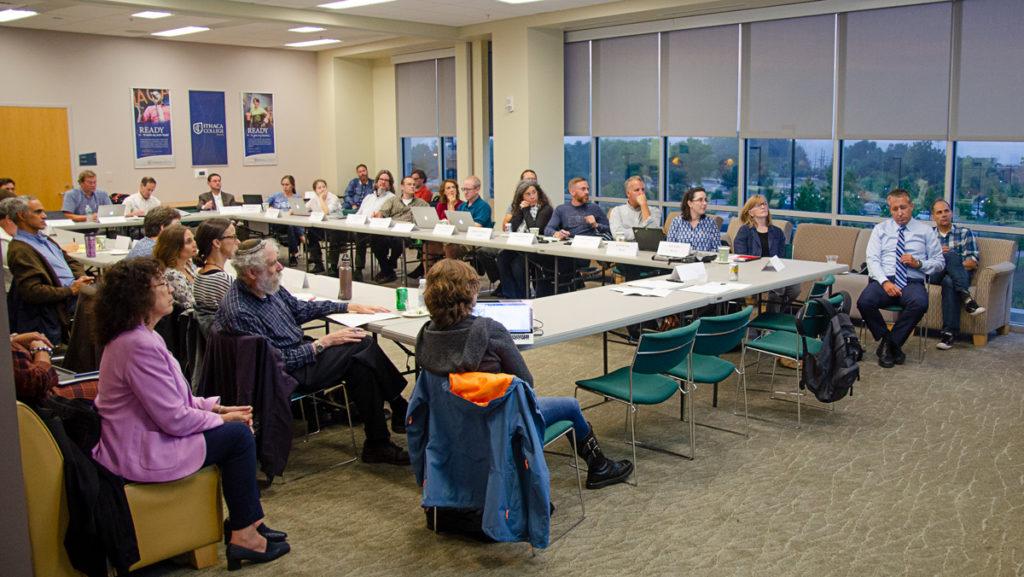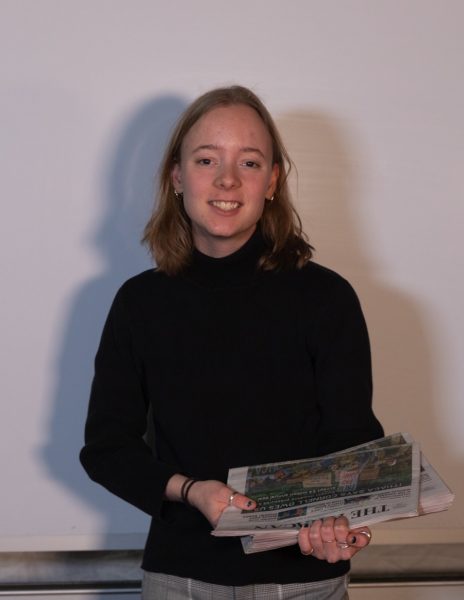The Ithaca College Faculty Council met with Tim Downs, vice president of Finance and Administration and chief financial officer, and discussed the college’s past, present and future financial status at its Nov. 9 meeting.
Downs spoke with the Faculty Council about the current budget at the college, as well as the projected finances and strategies to improve the college’s finances. Interim provost Melanie Stein also gave a brief update on the dean’s searches in her report.
Aaron Witek, assistant professor in the Department of Music Performance, asked Downs about the increase for both tuition and discount rate — how much the college makes in revenue after providing students with institutional financial aid. He asked if there was any way to advertise the lower cost of the college.
Downs said the college provides each student with a $10,000 scholarship instead of decreasing tuition for every student. He said if the college were to decrease tuition instead of providing the scholarship, it would receive financial gains early in the year, but still end up in the same place by the end of the year. Downs said the discount rate at the college has been increasing faster than the tuition and room and board rates, but the yield — the number of students who enroll at the college out of the total number of accepted students — has not improved.
“We’ve increased discount and seen yield drop or stay flat,” Downs said. “So that’s where again, we don’t see that as the lever and we now need to look at what are the issues and again, there’s many factors here and you know, from my standpoint, reputation is one of them.”
Charis Dimaras, professor in the Department of Music Performance, asked Downs about how he feels about the part of Ithaca Forever — the five-year strategic plan — that states that 5,000 students would be the target enrollment number for the college.
Enrollment at the college has been decreasing over the past few years, mirroring national trends for colleges in the Northeast. According to the Office of Analytics and Institutional Research, there are a total of 5,239 students enrolled in Fall 2021. In Fall 2020, 5,354 students were enrolled at the college.
The “Shape of the College” document, released as a part of the Academic Program Prioritization process, states that a key focus of the process was to align the size of the faculty with the size of the student body, which was based on a projected student population of 5,000.
“The enrollment projection of 5,000 for the foreseeable future is both realistic and aspirational, and reflects numerous factors including but not limited to, the recognition of a decreasing college-going population nationwide, our anticipated attrition based on our historic patterns, and a gradual loss of market share over the past decade,” the document states.
Downs said if the college targets 5,000 students as its desired number, it would be living on a razor’s edge if it dipped down or went below. He said he thought 5,000 was too specific of a number and the college needs to target to be above or below 5,000 students.
“What’s the perfect number for the college?” Downs said. “It’s going to depend if we either need to target to be above 5,000, or we need to target to be below 5,000. And each one is going to come with a different set of solutions and outcomes based on what we do, but that’s what we are working on … Can we hit those enrollment numbers? Can we hit those retention numbers? Those are going to be big factors that, over the next year, we’re going to really need to lean in to determine whether those are the right models and inputs we’re putting in and then go from there.”
In her report, Stein gave a brief update about the current deans searches at the college.
There are currently four interim deans out of the five schools at the college: Jack Powers in the Roy H. Park School of Communications, Alka Bramhandkar in the School of Business and Ivy Walz in the School of Music. However, there will only be three searches. Stein is the dean of the School of Humanities and Sciences, but took on the position of interim provost after La Jerne Cornish was named interim president for the 2021–22 academic year. Claire Gleitman is the interim dean of the School of Humanities and Sciences while Stein is interim provost.
At the Oct. 5 State of the College Gathering, Stein said the search committee chairs have all been appointed. Jack Bryant, associate professor and program director of the Department of Media Arts, Sciences and Studies, will chair the dean search for the School of Communications; Christine Bataille, associate professor and chair of the Department of Management, will chair the dean search for the School of Business; and Chrystyna Dail, associate professor in the Department of Theatre Arts, and James Mick, associate professor in the Department of Music Education, are co–chairing the dean search for the new combination of music and theatre arts.
At the Faculty Council meeting, Stein said she was hoping to release information about the deans search committees the week of Nov. 8. Stein said the college would be partnering with WittKieffer, an executive search firm. She said the college has partnered with the firm for dean searches in the past.
Courtney Young, assistant professor in the Department of Theatre Arts, asked if the search agency would be open to faculty members submitting names for potential deans.
Stein said that is a standard practice and she is sure that will be a part of the process. She said that would be part of the active phase of the search, which will happen in the spring semester. She said the first part of the search, which will happen this semester, will feature more work from members of the campus community.
“It’s writing the leadership profile, soliciting input from the campus about what they’re looking for in the new dean and doing all of that stuff,” Stein said. “That’s the sort of the lead up that’s going to be happening this semester.”









